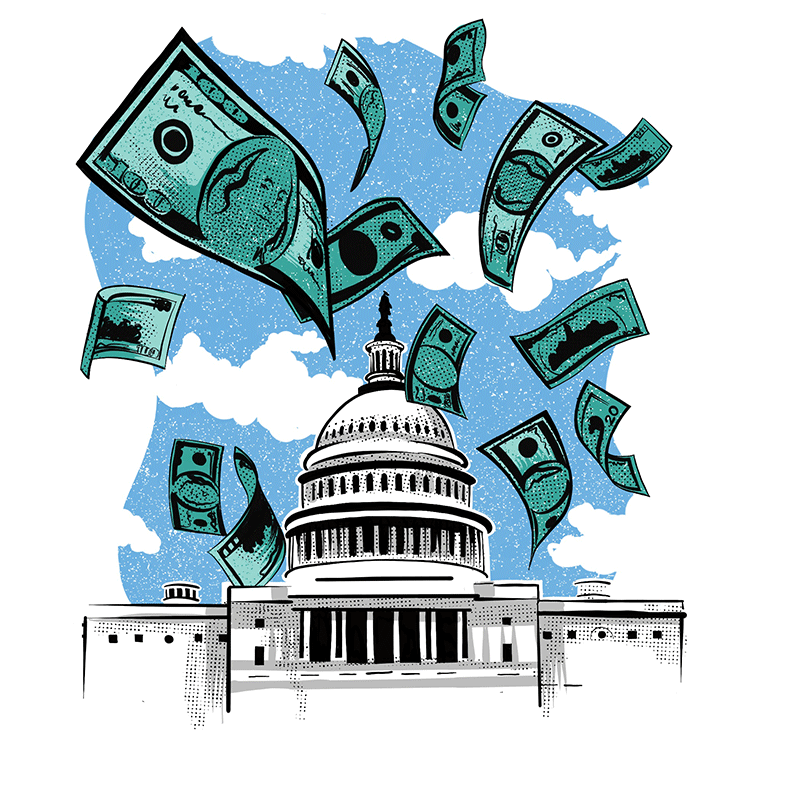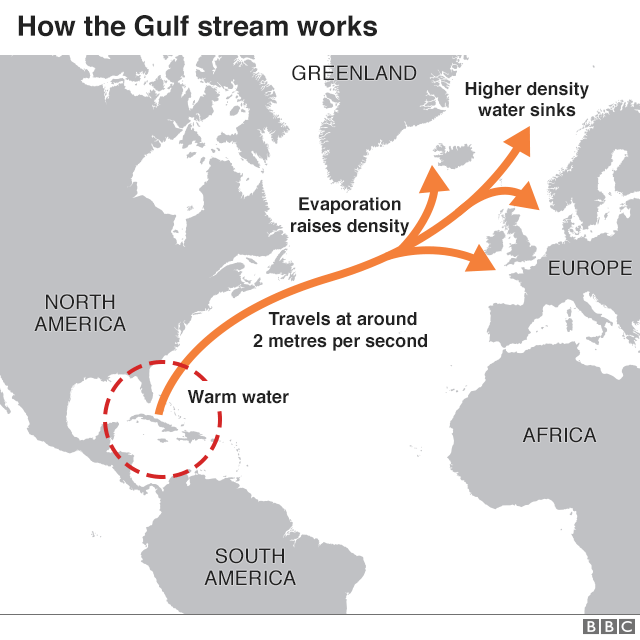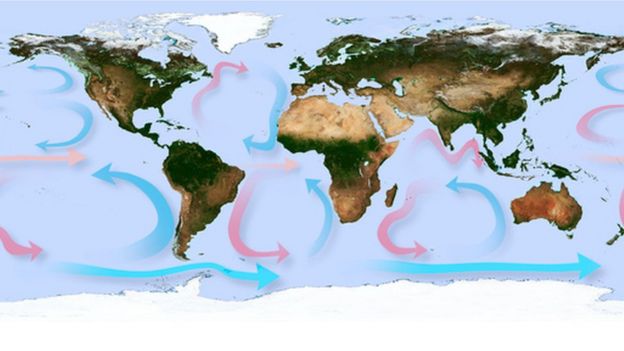Salon
Labor has a far-right problem: Why some unions are cheering Trump’s immigration crackdown
ICE and Border Patrol unions have emerged as among the biggest cheerleaders of Trump’s immigration policies
By Sarah Lazare and Michael Arria July 23, 2018
(Getty/AP/Photo Montage by Salon)
Just eight days later, the president of an AFL-CIO affiliate — the National Border Patrol Council (NBPC) —w rote a column for Fox News forcefully defending Trump and arguing for more hardline immigration policies, including a wall between the United States and Mexico. “If families can’t enter illegally, then they won’t be separated while the adults await trial and sentencing,” wrote Brandon Judd, head of the NBPC, which represents 16,000 border patrol agents.
This divide raises pressing ethical questions for the U.S. labor movement, whose ranks are filled with undocumented workers demanding basic safety and dignity on the job, but which also includes unions representing U.S. Border Patrol and Immigration and Customs Enforcement (ICE) agents. Those unions constitute the far-right pole of the labor movement — and of the U.S. political spectrum — backing Trump and his hardline immigration policies. In These Times spoke with union members, as well as immigrant justice activists, who say the white supremacist and xenophobic positions of immigration enforcement unions are an affront to the principles of justice and solidarity that the labor movement should embrace as the undocumented workers in its ranks face unprecedented attack.
“There is no place for racism or xenophobia in the labor movement,” Sam Gutierrez, an activist member of American Federation of State, County and Municipal Employees (AFSCME) Local 2822, tells In These Times. “We have to understand when we are fighting for our rights, we are also fighting for everyone.”
The NBPC and the National ICE Council, a union representing ICE employees, have emerged as among the biggest cheerleaders of Trump’s hardline immigration policies. They endorsed him during the presidential election and have forcefully defended him in the press and lobbied for his most aggressive immigration policies. Amid mounting public outrage at family separations, Judd publicly defended the policy and called for more draconian actions, including the construction of a wall along the U.S.-Mexico border. The leadership of National ICE Council, meanwhile, has publicly expressed frustration that the president is too soft on immigration and is open about its intentions to push the Trump administration further to the right.
Doing public relations for Trump
The Trump administration’s “zero-tolerance” immigration policy, including the forced separation of more than 2,300 children from their parents at the border, has provoked widespread public outrage. People have taken to the streets across the country, occupied ICE detention centers and blockaded court proceedings. As the call to Abolish ICE goes mainstream, the Trump administration claims it will jail families together — yet, in reality, thousands of children are still separated.
In this climate, Judd hit the media circuit to defend Trump’s policies, appearing June 19 on NPR, where he argued that the media is largely overblowing the horrors of the Trump administration’s immigration policies—and falsely claimed that Border Patrol agents are not separating families for meaningful amounts of time. In a June 30 appearance on Fox and Friends, Judd again championed Trump’s proposed wall, which he said is a result of the “business expertise” Trump is “taking to the White House.” In a May 20 interview with Fox News, Judd defended Trump’s description of some immigrants as “animals,” saying “”They’re worse than animals, in my opinion. . . . Animals do not treat other animals the way MS-13 treats other human beings.”
During this period, the website and social media account of the NBPC looked nearly indistinguishable from the website of white nationalist publication Breitbart, referring to immigrants as “illegals” and choosing inflammatory headlines for its posts. Breitbart, incidentally, is where the union records its official podcast.
But the union’s pro-Trump public relations efforts predate his presidential victory. In March 2016, the NBPC broke with past practice of not endorsing presidential primary candidates, and came out in support of Trump. “We think it is that important: If we do not secure our borders, American communities will continue to suffer at the hands of gangs, cartels and violent criminals preying on the innocent,” said the union in its endorsement statement.
There is reason to believe Trump finds the alliance useful. In January, Judd appeared in an official White House video, in which he says, “The Trump administration has accomplished more in one year to secure our border than any other presidents. … He wants to ensure the American public is safe. He wants to ensure that we can go about our daily lives and not fear what might be coming across the border.”
On April 1, Judd went on Fox and Friends to call for even more hardline immigration policies, criticizing the policies that allow some people to leave detention facilities to attend immigration court at a later time. “They need to pass laws to end the catch-and-release program that’ll allow us to hold them for a long time,” Judd said. Trump immediately took to Twitter to echo Judd’s call, proclaiming: “Border Patrol Agents are not allowed to properly do their job at the Border because of ridiculous liberal (Democrat) laws like Catch & Release.”
The exchange prompted the New York Times to write a headline about Judd’s influence: “A Border Patrol Agent (and Frequent Fox News Guest) Has Trump’s Ear on Immigration.” Judd reiterated the demands in April 12 in testimony before the U.S. House of Representatives Committee on Oversight and Government Reform.
Pushing Trump further right
If anything, the ICE union is to the right of the NBPC — and of Trump. The National ICE Council, which says it represents roughly 7,600 “officers, agents and employees who work for the U.S. Immigration and Customs Enforcement,” endorsed Trump on the campaign trail but has grown frustrated with the Trump administration for not being aggressive enough on immigration. In a September 2016 statement explaining its first-ever presidential endorsement, the union citedTrump’s confrontational stance toward immigrants: “He has outlined core policies needed to restore immigration security—including support for increased interior enforcement and border security, an end to Sanctuary Cities, an end to catch-and-release, mandatory detainers, and the canceling of executive amnesty and non-enforcement directives.”
In January 2017, the union cheered Trump’s decision to build a wall along the Mexican border. “President Trump’s actions now empower us to fulfill this life saving mission,” reads part of its joint statement with the NBPC. By November 2017, however, the union began publicly declaring that the Trump administration had “betrayed” it by leaving Obama’s ICE team in place. That same month, its president Chris Crane wrote an open letter accusing Trump of inflicting “a stab in the back to the men and women of law enforcement who we know you support wholeheartedly.” Among his grievances, he cited “ICE managers ordering their own officers in the field not to wear bullet-proof vests because illegal aliens might find it offensive.” The letter also cites alleged deal-making that ICE managers are making with so-called sanctuary cities.
In February, Crane released another letter to the White House criticizing Trump’s immigration strategy: “We simply cannot in good faith support any legislative effort on immigration that does not include provisions regarding immigration detainers, sanctuary cities and the smuggling and trafficking of children across U.S. borders.” The union wants more money to detain people, as well as an end to “catch and release.”
Anonymous ICE employees have also created a website that criticizes the leadership of ICE and the Department of Homeland Security for not being tough enough on immigrants, citing articles from Breitbart. One typical headline reads, “ICE Officers forced to warn city officials before making arrests; Criminals and Fugitives ‘magically disappear’ before they can be arrested.”
There are signs that the Trump administration has been influenced by the political efforts of these unions. In January 2017, the president publicly thanked Judd and Crane, identifying them as “two friends of mine.” Trump said, “You guys are about to be very, very busy doing your job the way you want to do them.”
An unacceptable affiliation?
Both unions are chartered by the American Federation of Government Employees (AFGE), an AFL-CIO affiliate. The AFGE hasn’t taken an official position on the border crisis, but in the past, the border patrol union has praised the AFGE, saying the NBPC’s parent union has “gone above and beyond” in supporting it.
The NBPC is less pleased with the AFL-CIO and its stance on immigration. In the FAQon its website, the union justifies its AFL-CIO affiliation to its members by stating that, if it disaffiliated, the union would be placed in trusteeship by AFGE and lose its assets and status as the exclusive representative of border patrol agents. “Although NBPC is opposed to the shameless promotion of illegal aliens by the AFL-CIO, the NBPC must work through internal measures to change the position of AFL-CIO or risk jeopardizing our status,” reads the section. (When asked for comment, the AFL-CIO referred In These Times to Trumka’s aforementioned statement on the border crisis.)
For some labor and immigrant-justice activists, the affiliation is unacceptable. In 2016, the immigrant justice group #Not1MoreDeportation released a petition calling on the AFL-CIO to terminate the NBPC’s membership after the border patrol union endorsed Trump. “NBPC’s endorsement shines light on the disconnect between Border Patrol, immigrant communities and the rest of the labor movement across the United States,” reads the statement. “By endorsing Trump, Border Patrol endorses a racist, xenophobic and misogynist campaign that advocates mass deportation, torture, state-sanctioned discrimination against Muslims, subordination of women, and more broadly undermines the values and goals of the labor movement.”
There’s a precedent for the AFL-CIO to expel unions for political reasons — although, troublingly, it has only been applied to progressive unions: In 1949 and 1950, the CIO expelled 11 left-led unions, joining the liberal Cold War consensus and aligning itself with McCarthyism. The unions represented almost one million workers altogether and the ensuing strife ultimately led to the CIO merging with the American Federation of Labor (AFL) in 1955. Some of the expelled unions were able to survive outside of the AFL-CIO. One, the International Longshore and Warehouse Union (ILWU), rejoined the AFL-CIO in 1988, but chose to leave again in 2013 after the AFL-CIO failed to punish unions whose members had crossed an ILWU picket line.
The way the constitution of the AFL-CIO is currently written, it would be difficult to isolate the Border Patrol and ICE unions, since they’re within the AFGE, which also represents other federal and Washington, D.C.-based workers. However, with a two-thirds vote at one if its conventions, the AFL-CIO could conceivably amend the constitution to say it can expel certain chapters without expelling the whole affiliate. The AFL-CIO also has the option of pressuring AFGE to stop chartering the Border Patrol and ICE unions.
Whatever the best procedural path, some rank-and-file union members say the labor movement must grapple now with the urgent moral questions presented by the actions of border patrol and ICE unions. “As a federation, we cannot condone their behavior,” says Gutierrez, whose union is part of the AFL-CIO.
Carl Rosen, president of United Electrical Workers Western Region, told In These Times that he prefers not to comment on the AFL-CIO question, since his union is not a part of the federation. But he argues that the actions of border patrol and ICE unions should prompt soul searching on the part of the labor movement. “It’s extremely unfortunate that these organizations are taking those sorts of positions that are extremely destructive to the working class and antithetical to what the labor movement ought to stand for,” he said. “I think it is important for the labor movement as a whole to stand up on the side of justice and condemn organizations taking those positions.”
In a labor movement where other law enforcement unions have historically generated controversy and internal opposition, at least one labor council appears to be encouraging immigration enforcement agents to refuse orders. On June 26, Rusty Hicks, the head of the Los Angeles County Federation of Labor, released a statement declaring, “As L.A. labor, we call on immediate and comprehensive reform of the U.S. immigration detention system. We commit to defending and protecting all immigrants. We also commit to defending and protecting all workers who take a stand against orders they are asked to carry out in violation of basic human rights.”
And in February, Jordon Dyrdahl-Roberts, an employee at Montana’s labor department, quit his job after he learned that his agency was sending employee information to ICE. He called on other government employees to do the same. “So this is me, pointing at you, and telling you to act,” he wrote in a Medium post. “I’m especially telling you to take action if you find yourself as part of one of the agencies helping commit these atrocities.”
As the labor movement fends off attacks from Trump’s National Labor Relations Board and attempts to organize more workers, including undocumented immigrants, who are highly exploited by employers, its response to the current crackdown on immigrants could impact its success moving forward. According to Amy Livingston, a labor educator at the University of Minnesota at Minneapolis, “The call for the labor movement to divest from Border Patrol and ICE unions is a meaningful opportunity for the mainstream U.S. labor movement to stand with workers and communities of color by rejecting white supremacy.”
Carlos Rojas Rodriguez is an organizer with Movimiento Cosecha, which organizes undocumented workers to build collective power. He tells In These Times, “Unions have a responsibility to protect workers, and in the United States we have one of the most diverse workforces in the whole world. The recent statements made by the ICE and CBP unions defending Trump’s anti-immigrant and anti-worker policies are a betrayal to union values.”




 The Center for Budget and Policy Priorities, a progressive think tank,
The Center for Budget and Policy Priorities, a progressive think tank, 














 The presidents and interpreters. Photograph: Kevin Lamarque/Reuters
The presidents and interpreters. Photograph: Kevin Lamarque/Reuters












